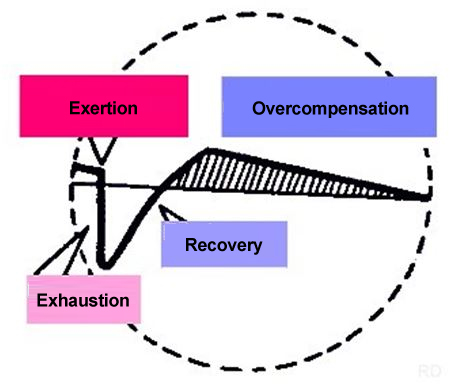Running is good for body, mind and soul. But too much running (as is often the case with just about everything else in life) is not. The right balance of running, active rest (or cross training) and recovery is crucial to effective and efficient training. You must pay attention and adjust your training accordingly when factors such as family, job, sleep, illness and diet affect your ability to exercise.
Training + Recovery = Increased Efficiency
Training is one very important component to becoming a more efficient runner. Yet, optimal performance occurs only when the training stimuli is balanced with a solid recovery plan. Each workout leads to fatigue and a dwindling of the energy sources. After the workout, it is imperative that an athlete replenish those energy sources and recuperate to receive the full benefit of that workout. By continually breaking down the body with workouts and then recovering from those workouts you experience an ‘overcompensation’phase and you’ll see a boost in performance. On the other hand, training too soon without adequate recovery can lead to overtraining which can manifest itself in fatigue, performance degradation, increased heart rate and a weakened immune system.

Training Balance
The right balance between the intensity and the duration of the sessions should be monitored. Typically, a rest or recovery day follows an intense run day. This easy day can include very light running, or, better yet, an alternative activity like swimming, biking or nordic skiing. Also, the long run day should be well planned and worked around. If a training session must be moved, other training during the week may need to be modified or skipped. Your running.COACH training plan will adapt to external circumstances.
Don’t try to fit everything in if it’s just not going to work. To avoid overtraining, it’s best to err on the side of caution. With that said, your running.COACH plan has been laid out to maximize the training effect, so try your best to stick to the plan.

Nutrition and Body ‘Signals’
Your diet plays a significant role in your ability to handle the training stimuli. Your everyday food choices play a large role in your overall performance. The food you eat before, during and after your workout help with both today’s as well as tomorrow’s workout. As important as anything else, keep the fun in your training and listen to your body’s signals constantly. If you’re feeling tired and worn out, it’ll be counterproductive to do a hard workout. Your body’s signals or feelings should overrule ‘what’s today’s workout’in your calendar. This way, you’ll reduce the risk of overtraining, and in the long term, get more joy from your running.
Lots of success and fun with your training!
This blog was written by Ingalena Heuck, sports scientist and German Champion (2010) in the half-marathon.
